山西省应县第一中学校20182019学年高一英语11月月考试题三
- 格式:doc
- 大小:151.50 KB
- 文档页数:9
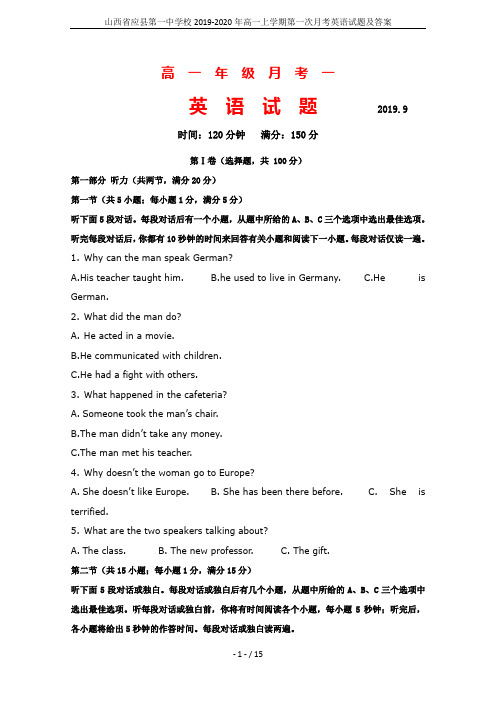
高一年级月考一英语试题2019.9时间:120分钟满分:150分第Ⅰ卷(选择题,共 100分)第一部分听力(共两节,满分20分)第一节(共5小题;每小题1分,满分5分)听下面5段对话。
每段对话后有一个小题,从题中所给的A、B、C三个选项中选出最佳选项。
听完每段对话后,你都有10秒钟的时间来回答有关小题和阅读下一小题。
每段对话仅读一遍。
1.Why can the man speak German?A.His teacher taught him.B.he used to live in Germany.C.He is German.2.What did the man do?A.He acted in a movie.B.He communicated with children.C.He had a fight with others.3.What happened in the cafeteria?A.Someone took the man’s chair.B.The man didn’t take any money.C.The man met his teacher.4.Why doesn’t the woman go to Europe?A.She doesn’t like Europe.B. She has been there before.C. She is terrified.5.What are the two speakers talking about?A.The class.B. The new professor.C. The gift.第二节(共15小题;每小题1分,满分15分)听下面5段对话或独白。
每段对话或独白后有几个小题,从题中所给的A、B、C三个选项中选出最佳选项。
听每段对话或独白前,你将有时间阅读各个小题,每小题5秒钟;听完后,各小题将给出5秒钟的作答时间。
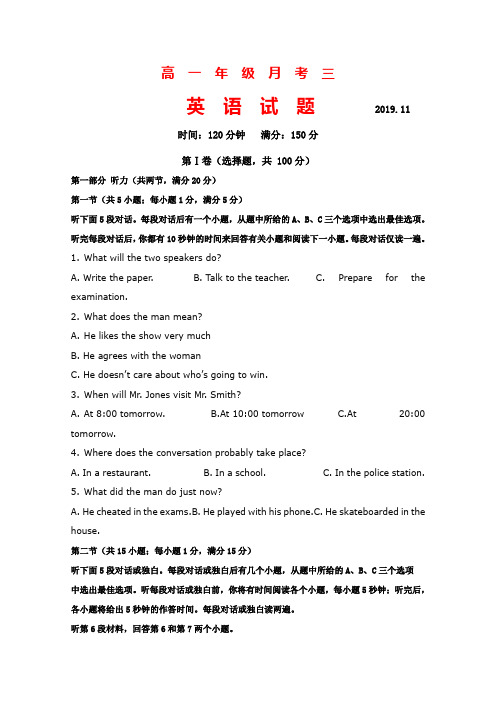
高一年级月考三英语试题2019.11时间:120分钟满分:150分第Ⅰ卷(选择题,共 100分)第一部分听力(共两节,满分20分)第一节(共5小题;每小题1分,满分5分)听下面5段对话。
每段对话后有一个小题,从题中所给的A、B、C三个选项中选出最佳选项。
听完每段对话后,你都有10秒钟的时间来回答有关小题和阅读下一小题。
每段对话仅读一遍。
1.What will the two speakers do?A. Write the paper.B. Talk to the teacher.C. Prepare for the examination.2.What does the man mean?A.He likes the show very muchB. He agrees with the womanC. He doesn’t care about who’s going to win.3.When will Mr. Jones visit Mr. Smith?A.At 8:00 tomorrow.B.At 10:00 tomorrowC.At 20:00 tomorrow.4.Where does the conversation probably take place?A.In a restaurant.B. In a school.C. In the police station.5.What did the man do just now?A.He cheated in the exams.B. He played with his phone.C. He skateboarded in the house.第二节(共15小题;每小题1分,满分15分)听下面5段对话或独白。
每段对话或独白后有几个小题,从题中所给的A、B、C三个选项中选出最佳选项。
听每段对话或独白前,你将有时间阅读各个小题,每小题5秒钟;听完后,各小题将给出5秒钟的作答时间。
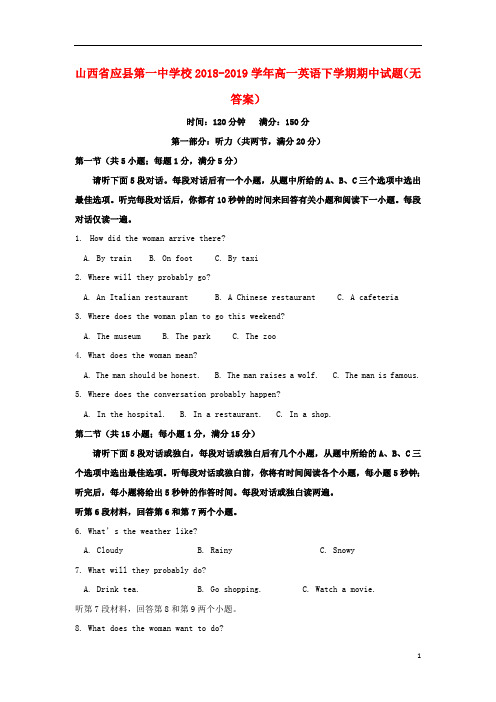
山西省应县第一中学校2018-2019学年高一英语下学期期中试题(无答案)时间:120分钟满分:150分第一部分:听力(共两节,满分20分)第一节(共5小题;每题1分,满分5分)请听下面5段对话。
每段对话后有一个小题,从题中所给的A、B、C三个选项中选出最佳选项。
听完每段对话后,你都有10秒钟的时间来回答有关小题和阅读下一小题。
每段对话仅读一遍。
1. How did the woman arrive there?A. By trainB. On footC. By taxi2. Where will they probably go?A. An Italian restaurantB. A Chinese restaurantC. A cafeteria3. Where does the woman plan to go this weekend?A. The museumB. The parkC. The zoo4. What does the woman mean?A. The man should be honest.B. The man raises a wolf.C. The man is famous.5. Where does the conversation probably happen?A. In the hospital.B. In a restaurant.C. In a shop.第二节(共15小题;每小题1分,满分15分)请听下面5段对话或独白,每段对话或独白后有几个小题,从题中所给的A、B、C三个选项中选出最佳选项。
听每段对话或独白前,你将有时间阅读各个小题,每小题5秒钟;听完后,每小题将给出5秒钟的作答时间。
每段对话或独白读两遍。
听第6段材料,回答第6和第7两个小题。
6. What’s the weather like?A. CloudyB. RainyC. Snowy7. What will they probably do?A. Drink tea.B. Go shopping.C. Watch a movie.听第7段材料,回答第8和第9两个小题。
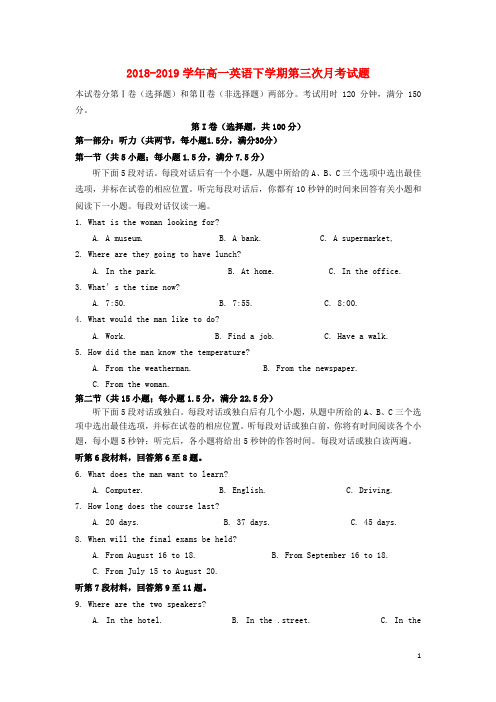
2018-2019学年高一英语下学期第三次月考试题本试卷分第Ⅰ卷(选择题)和第Ⅱ卷(非选择题)两部分。
考试用时120分钟,满分150分。
第I卷(选择题,共100分)第一部分:听力(共两节,每小题1.5分,满分30分)第一节(共5小题;每小题1.5分,满分7.5分)听下面5段对话。
每段对话后有一个小题,从题中所给的A、B、C三个选项中选出最佳选项,并标在试卷的相应位置。
听完每段对话后,你都有10秒钟的时间来回答有关小题和阅读下一小题。
每段对话仅读一遍。
1. What is the woman looking for?A. A museum.B. A bank.C. A supermarket,2. Where are they going to have lunch?A. In the park.B. At home.C. In the office.3. What’s the time now?A. 7:50.B. 7:55.C. 8:00.4. What would the man like to do?A. Work.B. Find a job.C. Have a walk.5. How did the man know the temperature?A. From the weatherman.B. From the newspaper.C. From the woman.第二节(共15小题;每小题1.5分,满分22.5分)听下面5段对话或独白。
每段对话或独白后有几个小题,从题中所给的A、B、C三个选项中选出最佳选项,并标在试卷的相应位置。
听每段对话或独白前,你将有时间阅读各个小题,每小题5秒钟;听完后,各小题将给出5秒钟的作答时间。
每段对话或独白读两遍。
听第6段材料,回答第6至8题。
6. What does the man want to learn?A. Computer.B. English.C. Driving.7. How long does the course last?A. 20 days.B. 37 days.C. 45 days.8. When will the final exams be held?A. From August 16 to 18.B. From September 16 to 18.C. From July 15 to August 20.听第7段材料,回答第9至11题。

学2018-2019学年高一英语11月月考试题第一部分听力(共两节,满分30分)第一节(共5小题;每小题1.5分,满分7.5分)听下面5段对话。
每段对话后有一个小题,从题中所给的A、B、C三个选项中选出最佳选项。
听完每段对话后,你都有10秒钟的时间来回答有关小题和阅读下一小题。
每段对话仅读一遍。
What was the woman’s birthday gift?A. phone.B. A book.C. A coat.Where will the woman have theparty?A. At theman’shouse.B. Ata restaurant.C. At her house.When did the man buy the shoes?A.Three weeks ago.B. Two weeks ago.C.Three days ago.How did the man get injured?A. By playing basketball.B. By playing tennis.C. By running.What does the woman think of her piano playing?She is very professional.She is still a beginner.C. She doesn’t know how to play at all.第二节(共15小题;每小题1.5分,满分22.5分)听下面5段对话或独白。
每段对话或独白后有几个小题,从题中所给的A、B、C三个选项中选出最佳选项。
听每段对话或独白前,你将有时间阅读各个小题,每小题5秒钟;听完后,各小题将给出5秒钟的作答时间。
每段对话或独白读两遍。
听第6段材料,回答第6、7题。
When will the woman go to the library?A. On Thursday.B. On Friday.C. On Saturday.What does the man want to borrow?A. Books.B. Videos.C. Magazines.听第7段材料,回答第8、9题。
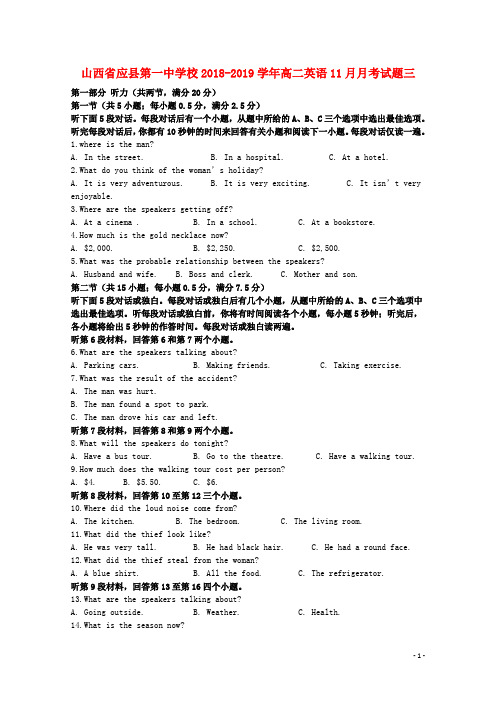
山西省应县第一中学校2018-2019学年高二英语11月月考试题三第一部分听力(共两节,满分20分)第一节(共5小题;每小题0.5分,满分2.5分)听下面5段对话。
每段对话后有一个小题,从题中所给的A、B、C三个选项中选出最佳选项。
听完每段对话后,你都有10秒钟的时间来回答有关小题和阅读下一小题。
每段对话仅读一遍。
1.where is the man?A. In the street.B. In a hospital.C. At a hotel.2.What do y ou think of the woman’s holiday?A. It is very adventurous.B. It is very exciting.C. It isn’t very enjoyable.3.Where are the speakers getting off?A. At a cinema .B. In a school.C. At a bookstore.4.How much is the gold necklace now?A. $2,000.B. $2,250.C. $2,500.5.What was the probable relationship between the speakers?A. Husband and wife.B. Boss and clerk.C. Mother and son.第二节(共15小题;每小题0.5分,满分7.5分)听下面5段对话或独白。
每段对话或独白后有几个小题,从题中所给的A、B、C三个选项中选出最佳选项。
听每段对话或独白前,你将有时间阅读各个小题,每小题5秒钟;听完后,各小题将给出5秒钟的作答时间。
每段对话或独白读两遍。
听第6段材料,回答第6和第7两个小题。
6.What are the speakers talking about?A. Parking cars.B. Making friends.C. Taking exercise.7.What was the result of the accident?A. The man was hurt.B. The man found a spot to park.C. The man drove his car and left.听第7段材料,回答第8和第9两个小题。
山西省应县第一中学校2018-2019学年高一英语下学期期中试题(无答案)时间:120分钟满分:150分第一部分:听力(共两节,满分20分)第一节(共5小题;每题1分,满分5分)请听下面5段对话。
每段对话后有一个小题,从题中所给的A、B、C三个选项中选出最佳选项。
听完每段对话后,你都有10秒钟的时间来回答有关小题和阅读下一小题。
每段对话仅读一遍。
1.How did the woman arrive there?A. By trainB. On footC. By taxi2. Where will they probably go?A. An Italian restaurantB. A Chinese restaurantC. A cafeteria3. Where does the woman plan to go this weekend?A. The museumB. The parkC. The zoo4. What does the woman mean?A. The man should be honest.B. The man raises a wolf.C. The man is famous.5. Where does the conversation probably happen?A. In the hospital.B. In a restaurant.C. In a shop.第二节(共15小题;每小题1分,满分15分)请听下面5段对话或独白,每段对话或独白后有几个小题,从题中所给的A、B、C三个选项中选出最佳选项。
听每段对话或独白前,你将有时间阅读各个小题,每小题5秒钟;听完后,每小题将给出5秒钟的作答时间。
每段对话或独白读两遍。
听第6段材料,回答第6和第7两个小题。
6. What’s the weather like?A. CloudyB. RainyC. Snowy7. What will they probably do?A. Drink tea.B. Go shopping.C. Watch a movie.听第7段材料,回答第8和第9两个小题。
学2018-2019学年高一英语下学期第三次月考试题本试卷分第Ⅰ卷(选择题)和第Ⅱ卷(非选择题)两部分,满分120分,考试用时120分钟。
第Ⅰ卷第一部分听力(共两节,满分20分)第一节(共5小题;每小题1分,满分5分)听下面5段对话。
每段对话后有一个小题,从题中所给的A、B、C三个选项中选出最佳选项,并标在试卷的相应位置。
听完每段对话后,你都有10秒钟的时间来回答有关小题和阅读下一小题。
每段对话仅读一遍。
1. What is Jacob going to do?A. He will have a class at 3:00.B. He will go home around 3:00.C. He will go to the library at 3:00.2. How does Michael want to go to Nanjing?A .By plane.B.By train.C.By car.3. What does the woman suggest?A. Put the telephone near the bed.B. Catch a later flight.C. Ask the hotel staff for help.4. Where does this conversation take place?A .In a restaurant.B.In a museum.C.In a theater.5. What does the woman believe?A. She left her wallet somewhere.B. Her friend may have borrowed her wallet.C. Somebody took her wallet.第二节(共15小题;每小题1分,满分15分)听下面5段对话或独白。
每段对话或独白后有几个小题,从题中所给的A、B、C三个选项中选出最佳选项,并标在试卷的相应位置。
2018-2019学年度下学期高一年级第三次月考第一部分听力(共两节,满分30分)第一节听下面5段对话,每段对话后有一个小题,从题中所给的A,B,C三个选项中选出最佳选项,并标在试卷的相应位置。
听完每段对话后,你都有10秒钟的时间来回答有关小题和阅读下一小题。
每段对话仅读一遍。
What will the man do right now?Finish his homework. B. Read about animals. C. Watch a TV show.How will the speakers go to Beijing?By train. B. By subway. C. By busWhere are the speakers?At home. B. At a store. C. At a restaurant.What does the man want to tell the woman?He loves listening to music. B. Ted probably broke the vase. He didn’t mean to break the vase.What are the speakers mainly talking about?A dream. B. Superman. C. One little girl.第二节听下面5段对话或独白。
每段对话或独白后有几个小题,从题中所给的A,B,C三个选项中选出最佳选项,并标在试卷的相应位置。
听每段对话或独白前,你将有时间阅读各个小题,每小题5秒钟;听完后,各小题将给出5秒钟的作答时间。
每段对话或独白读两遍。
听第6段材料,回答6.7题。
What does the man have for lunch today?Meat and vegetables. B. Just vegetables. C. Only meat. What does the woman think of the man’s diet?Interesting. B. Unhealthy. C. Popular.听第7段材料,回答8.9.题。
山西省应县2017—2018学年高一英语上学期月考试题(三)第一部分听力(共两节,每题1分,满分20分)第一节听下面5段对话。
每段对话后有一个小题,从题中所给的A、B、C三个选项中选出最佳选项,并标在试卷的相应位置.听完每段对话后,你都有10秒钟的时间来回答有关小题和阅读下一小题。
每段对话仅读一遍。
1。
Where are they talking?A。
In a library。
B。
In a gym。
C. In a bank。
2。
What are they mainly talking about?A。
A park. B. A bear. C. A camper.3。
How long is the library open on Saturdays?A。
For 13 hours. B。
For 10 hours。
C。
For 8 hours。
4。
When did Maria visit Yellowstone Park?A。
Last December。
B。
This March. C. This August。
5。
Where is the woman?A. On a bus. B。
In a street。
C. At a bus stop。
第二节听下面5段对话或独白。
每段对话或独白后有几个小题,从题中所给的A、B、C三个选项中选出最佳选项,并标在试卷的相应位置,听每段对话或独白前,你有时间阅读各个小题,每小题5秒钟;听完后,各小题给出5秒钟的作答时间,每段对话或独白读两遍。
听第6段材料,回答第6和第7两个小题。
6。
What are on the couch?A。
Some old clothes. B. Some dirty clothes. C. Some clean clothes.7. What will the man do next?A. Brush his teeth。
山西省应县第一中学校2018-2019学年高一英语11月月考试题三第一部分听力(共两节,每题1分,满分20分)第一节听下面5段对话。
每段对话后有一个小题,从题中所给的A、B、C三个选项中选出最佳选项,并标在试卷的相应位置。
听完每段对话后,你都有10秒钟的时间来回答有关小题和阅读下一小题。
每段对话仅读一遍。
1.What does the man advise the woman to wear?A. A suit.B. A uniform.C. A black dress.2. Where does the conversation probably take place?A. In a restaurant.B. In a hospital.C. In a shop.3. How many classes does the man have?A. Four.B. Three.C. Five4. What does the woman want the man to do ?A. Take her bike away.B. Go out with her.C. Repair her bike.5. Who likes music that has great lyrics?A. The woman.B. The man.C. Both of them.第二节听下面5段对话或独白。
每段对话或独白后有几个小题,从题中所给的A、B、C三个选项中选出最佳选项,并标在试卷的相应位置,听每段对话或独白前,你有时间阅读各个小题,每小题5秒钟;听完后,各小题给出5秒钟的作答时间,每段对话或独白读两遍。
听第6段材料,回答第6和第7两个小题。
6. Where does the woman want to go?A. The nearest hospital.B. The supermarket.C. The nearest subway station.7. How long does it take to go to the destination on foot?A. Ten minutes.B. Five minutes.C. Twenty minutes.听第7段材料,回答第8至9题。
8. What happened to the man?A. He bought a chicken farm.B. He failed in business.C .He sold his market garden.9. What does the woman mean?A. He should buy another farm.B. He shouldn’t change his job.C. He should believe in himself.听第8段材料,回答第10至第12三个小题。
10. Where is the woman from?A. The US.B. Spain.C. Korea.11. When will the woman’s family visit her?A. Next month.B. Next week.C. Next year.12. What’s the woman’s impression of people in New York?A. Friendly.B. Busy.C. Energetic.听第9段材料,回答第13至第16四个小题。
13. What’s wrong with Peter?A. He has a stomachache and a headache.B. He’s got seriously injured.C. He has a toothache.14. Where will Peter see a doctor?A. In the street.B. At home.C. At the university clinic.15. How will they go to the hospital?A. By car.B. By bus.C. On foot.16. When will Susan come to pick him up?A. At noon.B. After noon.C. At 3:00 pm.听第10段材料,回答第17至第20四个小题。
17. What kind of music is Taylor good at?A. Country music.B. Hip hop.C. Rock music.18. How old was she when Taylor had her first album?A. 20.B. 18.C. 17.19. What inspired the album 1989’s title?A. Her mother.B. The pop music scene of her birth year.C. Her boyfriend.20. How many copies of the album 1989 were sold?A. 1,287,000.B. 200,200.C. A million.第二部分阅读理解第一节:阅读下列短文,从每题所给的四个选项(A、B、C和D)中,选出最佳选项并在答题卡上将该项涂黑。
(每小题2.5分, 满分50分)AStudents in a college French class have helped fill the empty bookshelves of a very poor Haitian(海地的) school by writing 90 books. Although many children in Haiti speak Creole(克里奥尔语) at home, French is taught in classrooms and used by the government , and students are asked to know the language in order to get further education. Therefore, the class hoped to provide resources to help the young students learn French we ll.The project, called Little French Books, was headed up by Jennifer Shotwell, a French professor at Randolph-Macon College in Ashland, Virginia. Shotwell had visited Haiti with a group of students in 2013 to support a Haitian student and give books to a new library. Following the trip, Shotwell brought the experience back to her classroom.“My students have a chance to use the French language in a special way by writing children’s books,” Shotwell said. “Though some learners don’t think they can produce much with a new language, my students are learning to express themselves and create entertaining stories that we finally share with disadvantaged children who are also learning French.”Shotwell had sent French books to Haitian schools, but they were printed on cheap paper that could be easily broken. So she started a Kickstarter, which collected more than $1,000 to make books wi th durable covers.The books , which included stories about princesses, dinosaurs and exciting experiences, were given to the St.Gabriel’s school in Lascahobas.“Each time a chi ld gets into a new book, he will no doubt get new knowledge and new understanding. The Little French Books means a lot to our students, said Gardy Myrtil, a teacher at the school.21. Why do the college students create books for children in Haiti?A. To help the children learn French.B. To follow the government’s requirements.C. To stop the children from speaking Creole.D. To make the library open with enough books.22. What can we learn about the Little French Books?A. It was started in 2003 by a student.B. It is in charge of Jennifer Shotwell.C. It helps set up many new libraries in Haiti.D. It provides textbooks as well as storybooks .23. Which of the following can replace the underlined word “durable”in Paragraph4 ?A. strong.B. colorful.C. beautiful.D. thin.24. What doe s Gardy Myrtil want to say in the last paragraph?A. More libraries should be open for kids.B. She is thankful to the project for its e ffort.C. kids should read more books in their free time.D. The more books kids read, the clever they’ll be.BWe have a few travel ideas for people who want to plan for a fun but cheap trip. Our Places to Travel on Your Tax Refund will encourage you to travel in April. BostonOn your mark, get set, go! We’re off and running with ideas on where to stay, what to see and what to do if you’re heading to the Boston Marathon on April 20. Plan for Marathon Monday and your trip to Beantown with our useful Guide to Boston and Boston vacation ideas.Indio, CaliforniaHundreds of people will head to Indio, California, for the Coachella Valley Music and Arts Festival on April 10-12 and April 17-19. It’s one of the larg est music festivals in the US. Artists this year include OutKast, Muse and Arcade Fire. We suggest a visit to Palm Springs if you have time.AmsterdamAmsterdam is a hot place in April . Locals celebrate king’s Day on April 27. It’s one of the world’s bigg est street parties, celebrating the Dutch royal house and King Willem-Alexander. April also marks the st art of the city’s beautiful tulip(郁金香) season. We recommend visitors to take a relaxing walk through Keukenhof Spring Gardens.New OrleansHead to the Big Easy to experience the best in music at the New Orleans Jazz& Heritage Festival, held from April 24 to May 3. This year’s festival features artists including Eric Clapton, Bruce Springsteen, Christina Aguilera, Phish and the Arcade Fire. Plan your trip with our suggestions on where to stay, what to do and where to eat in New Orleans.25. In Boston, what can attract people on April 20?A. A sports event.B. A music festival.C. Cheap hotel rooms.D. A free trip to Beantown.26. If you are a fan of OutKast, where would you most probably go in April?A. Boston.B. Indio, California.C.Amsterdam.D. New Orleans.27. What is Amsterdam most probably famous for in April?A. A pop concert.B. The sea of tulips.C. The house parties.D. A comfortable season.28. When should you go to New Orleans for the music festival there?A. On April 20.B. From April 10 to April 12.C.From April 17 to April 19.D. From April 24 to May 3.CArcherfish(射水鱼), a species famous for spitting (吐) water to shoot insects out of the air, can recognize one human face from another.In the laboratory, instead of shooting insects , the fish were taught to spit at pictures of human faces showed on a computer screen outside their aquarium. The fish were first introduced to two faces, and taught to spit at one of them in exchange for a food reward. The researchers then tested whether the fish would recognize and spit at the face they had learned from among 44 new ones. And they were right more than 80% of the time.To the researchers’ surprise, even when they did that with faces that were in black and white, the fish were still able to find the face they were trained to recognize. Telling one human face from another is a surprisingly difficult task. As we all have two eyes above a nose and a mouth, doing so depends on recognizing some extremely small differences.“It has been supposed that this task is so difficult that it can only be completed by higher animals, w hich have a large and complex brain,” said Newport, whose study was published in the journal Scientific Reports. “But the archerfish were able to do this without having a neocortex, the most recently developed part of the brain. In humans, the neocortex go verns our sense and language.”“Fish have a simpler brain than humans and they don’t have the section of the brain that humans use for recognizing faces,” Newport said. “Even though, many fish show amazing visual (视力的) behaviors and therefore make the perfect subjects to test whether simple brains can complete complex tasks.”29. What were the archerfish asked to do in the laboratory?A. Pick out the face they knew.B. Shoot the computers from a far distance.C. Count the number of faces o n the screen.D. Pick out black and white pictures from colorful ones.30.What can we learn about the archerfish?A. They have a complex brain.B. Their neocortex is very large.C. They belong to higher animals.D. They have excellent eyesight.31. What is the purpose of the text?A. To encourage people to protect fish.B. To introduce a kind of fish with special ability.C. To introduce the result of a study on archerfish.D. To show that animals with simpler brains are smarter.D7-year-old Anaya Ellick was born without hands, but she’s mastered the art of writing by holding her pencil in between the ends of her arms. The great first-grader refused to use prosthetics(假肢), but chose to practice using her own arms. Anayagot so good at it that this year she actually won the National Handwriting Competition for her beautiful writing.Anaya’s parents, Bianca and Gary, were naturally shocked and worried sick when they first found out she didn’t have hands. But Anaya proved to be a normal child, learning even earlier to tie her shoes, dress herself, and trying to do other things by herself before asking for help. Her ambitious (有雄心的) nature was also mentioned by Tracy Cox, the headmaster of her school. “There is truly very little that this girl cannot do,” she said. “ She is d etermined (有决心的), independent, lovely and active. She is a no-excuses type of young lady.”It was Cox who entered Anaya for the handwriting competition held by Zaner-Bloser. Anaya competed against 50 other children with intellectual, physical, or developmental disabilities and managed to win first place, a $ 1,000 prize and the respect of people around the world.“We looked at her writing and we were just surprised to see how beautiful her handwriting was, considering she writes without hands” said competition director Kathleen Wright. “Her writing sample was comparable to that of someone who has hands.”Needless to say, her parents are extremely proud, but for Anaya, this is just the beginning. H er father says she wants to do all these things, like playing soccer and doing gymnastics, and that if she could win first prize at such a competition despite having no hands, it’s clear that she can do anything she sets her mind to .32.What can we learn about Anaya from Para.2?A. She looks like a normal child.B. She tries to do things on her own.C. She attends a special school for disabled children.D. She is especially good at forming good habits.33. What can we know about the National Handwriting Competition?A. It was first held by Tracy Cox.B. It was held for those special children.C. Fifty children took part in it every year.D. Every child will be given a prize after it.34. What do Kathleen Wright’s words mean?A. She is proud that Anaya won first p lace.B. She doesn’t think Anaya shoul d get the prize.C. She thinks Anaya’s writing sample is the best.D. She is praising Anaya for her beautiful handwriting.35. What can we learn from Anaya’s story?A. No pains no gains.B. Behind bad luck comes good luck.C. Nothing is difficult to a willing mind.D. Pay somebody back in his own coin.第二节:根据短文内容,从短文后的选项中选出能填入空白处的最佳选项。